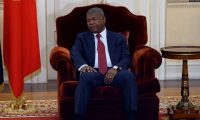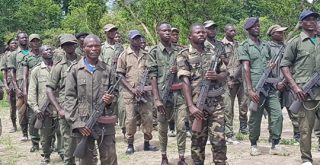Since leading Angola in 2017, Joao Lourenço has built an image of a relatively open and moderate president. But in the province of Cabinda (north), the separatists accuse him of continuing the policy of repression of his predecessor José Eduardo dos Santos.
Long-time activist for the cause of Free Cabinda, Jeovanny Ventura does not mince his words.
“What the Angolan state is doing to us is persecution. The authorities are treating us like terrorists,” he said. “And it hasn’t improved with Joao Lourenço. Everything we organize always ends in detention.”
Like last January. Some 70 supporters of the Cabinda Independence Movement (MIC) are arrested as they prepare for a demonstration to celebrate an 1885 treaty that made the Cabindan entity a Portuguese protectorate.
Born from the colonial division of Africa, Cabinda is a confetti stuck between the two Congos, which fell under the sovereignty of Angola upon its independence in 1975.
For more than forty years, the Front for the Liberation of the Enclave of Cabinda (Flec) has been leading the guerrillas there against the Angolan central power, which has deployed thousands of police and soldiers over the 7,000 km2 of the territory.
The last coup of the separatists dates back to 2010, when they strafed a bus of the Togo football team during the African Cup of Nations (CAN). The attack left two dead.
Political instability has not ceased since. Amnesty International and Human Rights Watch (HRW) regularly denounce arbitrary detentions and torture.
“Unlike other regions of Angola where there has been progress in terms of freedom of expression” since the coming to power of Joao Lourenço, the situation in Cabinda “remains tense“, notes Zenaida Machado of HRW.
– Oil –
“Activists cannot take advantage of their political rights because the authorities see them as a threat,” she adds, “not a month goes by without arbitrary detention, the right to demonstrate is a mirage“.
The presence off the coast of Cabinda of significant oil fields explains Angola’s interest in its northernmost province. It supplies 60% of the volume of black gold from Angola, the second largest producer in sub-Saharan Africa.
But its 400,000 inhabitants have not seen much of the green color of petrodollars.
“The people of Cabinda have never benefited from their oil,” denounces the pro-independence lawyer Arao Bula Tempo. “The unemployment rate is 88% and the only infrastructure that exists dates from colonization. Angola is doing nothing here.“
As soon as you leave the airport in the capital Cabinda, the state of the roads says more than a lot of talk. For lack of flow, they are flooded at the slightest storm. In the city, many neighborhoods are deprived of electricity, running water and sanitation.
In November, Mr. Lourenço chaired a decentralized meeting of the Council of Ministers in Cabinda. “I will personally follow all the projects in Cabinda so that, in the years to come, I can improve the situation,” he promised.
To hear its inhabitants, these were only fine words.
“The government regularly promises us new infrastructures but these are only lies“, accuses Carlos Vemba, the secretary general of the MIC.
”But the struggle continues,” he continues, ”we will do everything to defend our independence”.
For Mr. Vemba and his activists, the “struggle” has gone through the prison box. Two weeks for him. Up to three months for forty others, finally released without the slightest charge.
– ‘Open to dialogue’ –
“The political situation is catastrophic because the Angolan government does not want to talk to us“, regrets Alexandre Kwang N’sito, of the Association for the Development of Culture and Human Rights (ADCDH).
“I dialogue with all the opposition parties“, retorts the governor of the province, Eugenio Laborinho.
“The situation is calm and under control,” he continues. “There is a bit of social unrest around unemployment, but that’s all. Everyone says Flec, Flec, Flec, but I have never seen him.“
The Front regularly claims to kill soldiers in ambushes that the authorities in Luanda endeavor to never confirm, making any verification almost impossible.
In recent years, however, Flec’s victory announcements have become rarer.
“Our will to defend Cabinda against Angolan colonization is intact,” assures Flec spokesperson Jean-Claude Nitza. “We are open to dialogue but the government of Luanda does not want to negotiate a solution that would oblige it to recognize the rights of the people of Cabinda“.
As a last resort, the Flec has just asked for mediation from the President of the neighboring Democratic Republic of Congo, Félix Tshisekedi. His proposal has so far not received a response, neither in Kinshasa nor in Luanda.
Source : VOAAFRIQUE













